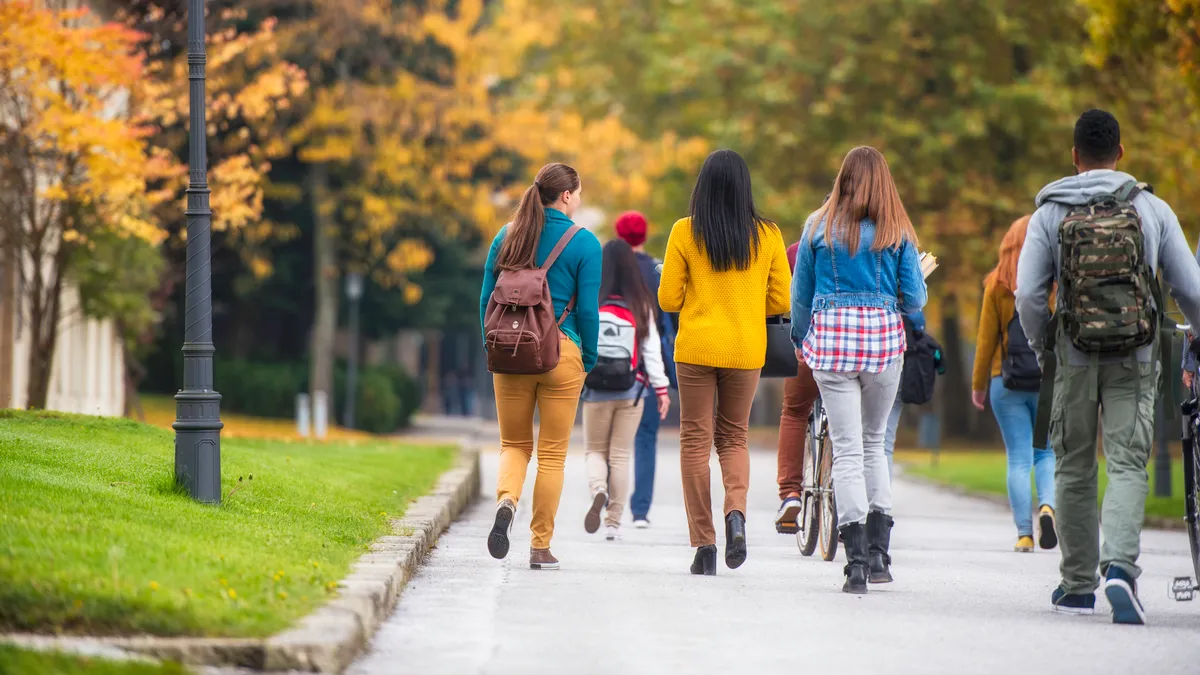“Effective philanthropy requires a lot of time and creativity — the same kind of focus and skills that building a business requires,” Bill Gates once notably said. In the case of Barnes & Noble College, that focus is often one and the same: supporting the campus community in both similar and unique ways. As a valued partner to the schools they serve, its bookstores must exceed the role of the traditional campus bookstore, serving as a support system for students and faculty, community convener, event planner — and also philanthropist.
The role of campus collaborator is a critical component at Penn State, where the bookstore will award $825,000 in grants over the next five years to seed new initiatives for students and faculty that advance the school’s most important priorities. The grants are part of a larger university-wide philanthropic commitment of $1.25 million from the bookstore.
CLASS COMMITMENT
Among the first cohort of 18 grantees is the Lion’s Pantry, which was created to address the issue of student hunger at Penn State’s University Park campus. The Class of 2017 chose to create a permanent, annual source of funding for this food pantry that helps those at risk by providing food, free of cost, to students with a Penn State ID. “We work with students every day, so we know that some students cut food expenses in order to pay for their education. No one should be in that position,” said Steve Falke, regional director of the Penn State Bookstores, who oversees 28 bookstores throughout the Penn State system. “Students have always supported the bookstore, therefore it is only natural that we partner with the class of 2017 in supporting the Lion’s Pantry to fight student hunger,” he added.
The Class Gift Campaign is using the Barnes & Noble College gift as a match: for every senior who makes a gift in any amount, the bookstore will match it with an allocation to the Pantry Endowment. “The endowment for Lion’s Pantry is an amazing legacy for the class of 2017,” said Sis-Obed Torres, 2017 Class Gift Campaign executive director and Penn State senior. “Not only are we identifying a serious issue within the student body, but we are also taking tangible steps forward to eliminate the problem.”
THE INTERSECTION OF PHILANTHROPY AND LEARNING
Giving back has long been a priority of the Penn State Bookstores, which have been managed by Barnes & Noble College since 1993. “We actually fund many campus initiatives that the community may not be aware of,” said Falke, who has been with the store for all of those 24 years. “We want to raise awareness that we’re part of the community in a way that no other store is. We focus on faculty and students, and provide opportunities where they may not exist otherwise.”
Long before the $825,000 grant money was pledged, the bookstore had been a staunch campus supporter. Among the recipients of its philanthropy are the Penn State Forum, which sponsors guest speakers eight to 10 times a year, and the Penn State THON Dance Marathon, which raises money for pediatric cancer patients and their families, and has received Barnes & Noble College sponsorship for all 24 years it’s managed the campus bookstore.
Another recipient is The Emergency Assistance Fund, which provides timely support for students who experience a personal crisis or an emergency situation. “Last year, eight students suffered extensive personal losses as a result of a fire, “ Falke recounted. “The Student Emergency Fund helped them move and replace books and clothes. It’s a critical interim step to help get them back on their feet.”
As the philanthropic model grew, Falke joined the development board of Penn State’s library, serving as a member for 15 years as well as its chair. “The development side of the house helps you understand the strategic vision of the university. Their fundraising initiatives provide a view to where they’re heading,” Falke explained. “Serving on the board gives me a seat at the table and an opportunity to become engaged in a conversation I wouldn’t otherwise have access. At large institutions, that’s really important.”
The university’s Library Enrichment Fund, an initiative the bookstore has long supported and sees as central to life at Penn State, receives $35,000 annually for open educational research, teaching and learning materials that may be freely used and reused at no cost and without permission. Working together to benefit the University, the library is a strategic bookstore partner, collaborating to lower the cost of materials to make education more affordable for students.
Another recipient is The FaceAge project — a collaboration among the colleges of Arts and Architecture, Health and Human Development, and Nursing. This immersive, three-screen video installation features cross-generational encounters; the grant will support touring of the video installation to state, national and international venues over the next three years. “For our grants, we put out requests for proposals where we would provide seed money. We received almost a $1 million in requests,” said Falke, who makes the final funding decisions with Penn State’s development office.
Falke also stressed how important it is for campus partners to work with the University to understand its strategies, mission and goals — and how the bookstore can serve as a catalyst for collaboration and support to achieve those goals. “We want to have the most visibility, as well as the most impact,” he said. “But more importantly, we’re here to support the University. That’s the ultimate goal.”





